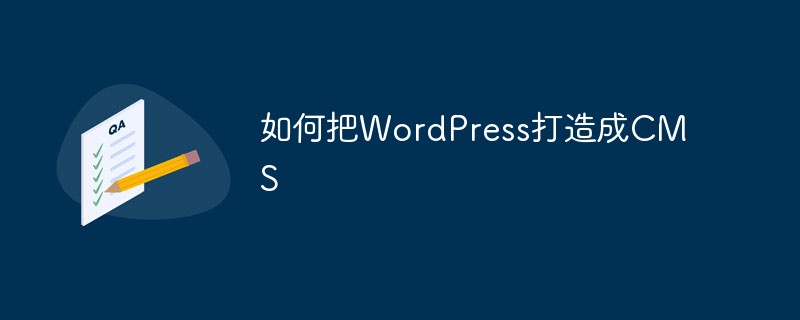如何把WordPress打造成CMS

把WordPress打造成CMS:
基于 WordPress 的强大功能,这样的修改是很简单,根本不用大改主题,根本不用动主题的index.php 文件,只需要创建了一个页面,然后在 WordPress 后台把这个页面设置为首页就可以了。
下面是具体的详细设置过程,只需要 5 个简单的步骤把 WordPress 打造成 CMS:
1、创建一个名字为“首页”的页面作为网站的,并给它的 Order(页面顺序)设置为 0。如果首页是需要定制的,比如没有侧边栏,分成各个板块,那么需要专门为首页创建 WordPress 页面模板,并且把该页的 Template 设置为该模板。
2、创建一个空的页面,命名为“博客”,并且把他的 Order(页面顺序) 设置为 99(如果你没有很多页面,那么 99 基本就排到最后了)。这个页面到时候将作为的原来日志列表的首页。
3、到 WordPress 后台,选择 Setting(选项) > Reading(阅读),将上面创建的 “首页” 作为 Front Page(起始页) 和 “日志” 作为 Posts Page(日志列表页)。
4、通过这个函数 wp_list_pages(’sort_column=menu_order&title_li=’) 创建网站导航菜单。这里使用了 sort_column=menu_order 这个参数就是让所有页面按照前面定义的 Order(页面顺序)排序输出。
5、进行更多的定制化工作,这个根据个人需求进行修改。当然也可以找专业人士定制和修改。
当创建其他页面的时候,让其他的页面的 Order 在 0 和 99 之间。这样的话,菜单中的第一个就是“首页”,最后的是“博客”,当然也可以根据自己的需求进行定制。
这样定制之后,首页的判断函数就为 is_front_page(), is_home() 这个判断函数则用于日志列表页面,这个使用的时候要注意分清楚,不然会引起错误。
更多相关技术文章,请访问PHP中文网!

Hot AI Tools

Undresser.AI Undress
AI-powered app for creating realistic nude photos

AI Clothes Remover
Online AI tool for removing clothes from photos.

Undress AI Tool
Undress images for free

Clothoff.io
AI clothes remover

Video Face Swap
Swap faces in any video effortlessly with our completely free AI face swap tool!

Hot Article

Hot Tools

Notepad++7.3.1
Easy-to-use and free code editor

SublimeText3 Chinese version
Chinese version, very easy to use

Zend Studio 13.0.1
Powerful PHP integrated development environment

Dreamweaver CS6
Visual web development tools

SublimeText3 Mac version
God-level code editing software (SublimeText3)

Hot Topics
 1386
1386
 52
52
 PHP vs. Flutter: The best choice for mobile development
May 06, 2024 pm 10:45 PM
PHP vs. Flutter: The best choice for mobile development
May 06, 2024 pm 10:45 PM
PHP and Flutter are popular technologies for mobile development. Flutter excels in cross-platform capabilities, performance and user interface, and is suitable for applications that require high performance, cross-platform and customized UI. PHP is suitable for server-side applications with lower performance and not cross-platform.
 In which folder are wordpress articles located?
Apr 16, 2024 am 10:29 AM
In which folder are wordpress articles located?
Apr 16, 2024 am 10:29 AM
WordPress posts are stored in the /wp-content/uploads folder. This folder uses subfolders to categorize different types of uploads, including articles organized by year, month, and article ID. Article files are stored in plain text format (.txt), and the filename usually includes its ID and title.
 Where is the wordpress template file?
Apr 16, 2024 am 11:00 AM
Where is the wordpress template file?
Apr 16, 2024 am 11:00 AM
WordPress template files are located in the /wp-content/themes/[theme name]/ directory. They are used to determine the appearance and functionality of the website, including header (header.php), footer (footer.php), main template (index.php), single article (single.php), page (page.php), Archive (archive.php), category (category.php), tag (tag.php), search (search.php) and 404 error page (404.php). By editing and modifying these files, you can customize the appearance of your WordPress website
 Which version of wordpress is stable?
Apr 16, 2024 am 10:54 AM
Which version of wordpress is stable?
Apr 16, 2024 am 10:54 AM
The most stable WordPress version is the latest version because it contains the latest security patches, performance enhancements, and introduces new features and improvements. In order to update to the latest version, log into your WordPress dashboard, go to the Updates page and click Update Now.
 Does wordpress need to be registered?
Apr 16, 2024 pm 12:07 PM
Does wordpress need to be registered?
Apr 16, 2024 pm 12:07 PM
WordPress requires registration. According to my country's "Internet Security Management Measures", websites that provide Internet information services within the country must register with the local provincial Internet Information Office, including WordPress. The registration process includes steps such as selecting a service provider, preparing information, submitting an application, reviewing and publishing, and obtaining a registration number. The benefits of filing include legal compliance, improving credibility, meeting access requirements, ensuring normal access, etc. The filing information must be true and valid, and must be updated regularly after filing.
 What is the wordpress article database?
Apr 16, 2024 am 11:12 AM
What is the wordpress article database?
Apr 16, 2024 am 11:12 AM
WordPress uses MySQL as its article database, its main functions include: storing articles, comments, users and website configuration data. The data tables include: wp_posts (articles), wp_postmeta (metadata), wp_comments (comments), wp_commentmeta (comment metadata), wp_users (users). The database can be accessed and managed via phpMyAdmin or the command line, and it is crucial to back up the database regularly to prevent data loss.
 How to delete theme template in wordpress
Apr 16, 2024 am 02:36 AM
How to delete theme template in wordpress
Apr 16, 2024 am 02:36 AM
To delete a WordPress theme template, first log into your dashboard, then go to Appearance > Theme Editor, select the theme you want to delete, click Delete and confirm, and optionally activate the new theme.
 How to add a secondary menu in wordpress
Apr 16, 2024 am 02:24 AM
How to add a secondary menu in wordpress
Apr 16, 2024 am 02:24 AM
You can add a secondary menu to your WordPress website by creating a main menu, adding top-level menu items, building a secondary menu, adding links and tags to it, setting the menu location, and viewing the secondary menu.




